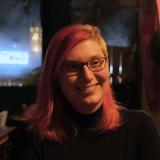After receiving her Bachelor of Computer Science in 2019, Clair started her career in web technologies and eventually specialized in designing the architecture for accessibility (a11y) features for cross-platform applications. Clair has returned to UBC to pursue a Master of Science in Computer Science, bringing an intersecting background of disability justice and technological expertise. She has had many years of leadership experience, such as acting as the chair for an employee resource group (ERG), where she was responsible for leading a team that organized social, educational, and professional development events for thousands of people. Clair uses such leadership skills in her personal life when contributing to her queer and disabled communities through mutual aid and social activism. She expresses her creativity through many mediums, such as designing and creating video games, tabletop games, video broadcasts, websites, and typesetting books. She keeps active by participating in soccer competitions and is learning to duel with a long sword. Clair is committed to furthering the ongoing disability justice work at UBC to enable a more accessible and inclusive campus.
Research Interests
As technology has become more central to our lives, it is increasingly important that everyone can interact with it in a way that works best for them. Clair wishes to further the field of Human-Computer Interaction (HCI) research with a focus on a11y for cognitive and physical disabilities. She believes there is more to learn about how artificial intelligence (AI) can close or remove the gaps in how disabled folks must conform to using technology designed for abled - or, more generally, hegemonic - bodies. Clair wishes to incorporate the ethics of AI in her research to avoid introducing damaging biases as much as possible. She believes that research intersecting AI and disability can do as much harm as good, so it is crucial to approach it within global cultural contexts. To guide her studies and any outcomes from them, Clair plans to draw from her lived experiences of working with technology as a disabled woman to align her academic career with the disability rights slogan "nothing about us without us."
